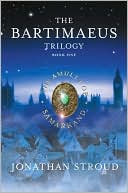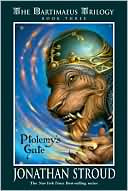The Bartimaeus Trilogy, by Jonathan Stroud: The Amulet of Samarkand (Hyperion/Miramax, 2003), The Golem’s Eye (2004), Ptolemy’s Gate (2005).
Reading Level: Young Adult, ages 12-14
Recommended for: Ages 12-14
Bottom line: The Bartimaeus trilogy by Jonathan Stroud pictures a neo-pagan world of demons and spirits, but does not glamorize it.
The sulfur cloud contracted into a thick column of smoke that vomited forth thin tendrils; they licked the air like tongues before withdrawing. The column hung above the middle of the pentacle, bubbling ever upward against the ceiling like the cloud of an erupting volcano. There was a barely perceptible pause. Then two yellow staring eyes materialized in the heart of the smoke.
Hey, it was his first time. I wanted to scare him.
At first glance, the Bartimaeus books look like a Harry-Potter knockoff: society of magicians, power conducted through spells with the help of supernatural beings, promising apprentices with special destinies. But expectations should be re-routed by page two, the first being that we’re dealing with an unmistakable voice here, and that’s the voice of the title character. Jonathan Stroud, a former editor-turned-author, has developed his own narrative method that veers to third person when following his other major characters, but always first person when the action switches to Bartimaeus: a 5,000 year-old, fourth-level djinni from the spirit world.
Let me address a valid objection right here: even more than in the Harry Potter books, we’re dealing with demons. Or rather daemons, the “rulers” and “cosmic powers” (Eph. 6:12) that haunted the ancient world, the conjuring of which (sorcery) was strictly prohibited in the Old Testament. There is a case to be made for avoiding any story that includes pentagrams, and I respect that case. Still, there are subtler values at work which might be worth paying attention to. For one, the Bartimaeus trilogy does a better job of presenting both the appeal and the repulsiveness of a pagan worldview than Percy Jackson and The Olympians does–and, in fact, better than any Christian tract. Bear with me . . .
In a modern-day alternate universe, London rules the British Empire and magicians rather than monarchs rule London. That’s been true ever since the great William Gladstone defeated the rival sorcerers of Prague. But the glory days are gone. War with the American colonies is draining patience and resources, the commoners are resentful and the government has become a bureaucracy of second-raters. Magicians procreate, at least professionally, by taking bright young schoolchildren into their homes to train in the magic arts. Arthur Underwood, a magician of middling status and competence, accepts a six-year-old boy named Nathaniel as apprentice. No one knows his last name, because his parents have disappeared after selling him into the service. And no one is ever to know his birth name because that knowledge would give his enemies power over him.
Enemies are a given; there’s no Hogwarts-style collegiality among the guild. Magicians are the most conniving, jealous, duplicitous group of people on earth, even including lawyers and academics. They worship power and the wielding thereof, and seek every chance they can to undercut their rivals. This is according to Bartimaeus, in a footnote.* He should know. Though a spirit of considerable power, he is continually at the beck and call of climbers and posers who can summon him from “the other place” merely by learning his name and the appropriate words. When he’s called to London by an unknown magician who turns out to be a mere kid, it’s only the beginning of five very challenging years.
Nathaniel is only twelve when he first summons Bartimaeus (in the passage quoted at the head of this post); when the series ends, he is seventeen. In each volume, he and his djinni must defeat a cabal whose overweening ambition threatens the social order, but Nathaniel himself has ambition to spare. He’s interesting that way. Young fantasy heroes like Harry Potter and Percy Jackson almost always possess an essential decency–though tempted, one senses that they are not corruptible. Nathaniel (who takes the professional name of John Mandrake) is corruptible: not only proud but vengeful, and embittered by the humiliating treatment he receives from his master and other magicians. He has better qualities, but they don’t fully emerge until near the end of the series. Though Nathaniel is the protagonist, Bartimaeus is always upstaging him: witty, wily, and wry; also sarcastic, irreverent, and cynical, with no taste for heroics. And no use for humans, except one: Ptolemy the Egyptian, who died in 125 B.C. All humans suffer in comparison with Ptolemy–especially Nathaniel. (Although it must be said that the qualities which make Bartimaeus so memorable a character are all-too-human.)
The antagonism, and rare grudging respect, between Bartimaeus and his master forms the emotional dynamic of the series, like mismatched cops in a buddy movie. Another level of antagonism develops in The Golem’s Eye with the character of Kitty Jones, a commoner and a lieutenant in the growing resistance movement. But in Ptolemy’s Gate, as the ultimate crisis approaches, the three are forced to work together in order to defeat the ultimate enemy. The way that defeat is accomplished adds up to one of the most thrilling, poignant, and satisfying conclusions I’ve ever read. Which I must partially reveal a few paragraphs down. (Watch out for the spoiler alert.)
What does paganism have to do with this? There are at least two kinds of “magic.” One kind seeks to control inanimate forces, dramatized by Harry Potter with his wands and spells (and bearing some resemblance to modern science). The other seeks to control personal spirits, and is also known as shamanism or necromancy. That’s the system imagined in Bartimaeus: an unknowable Ultimate Spirit or First Cause has spun off lower manifestations of itself, which in turn generate lower and lower forms, all the way down to rock and clay and the pathetic beings that crawl on it (i.e., us). Though arranged in a hierarchy, spirits (known as “gods,” in other cultures) have no controlling ethic. And, outside of their own personal favorites, they despise humans.
It’s popular in some circles to regard paganism as the bright sunlight of human possibility before dead Christian morals crashed the party. The opposite is true, as G. K. Chesterton ably demonstrated in Orthodoxy. Nathaniel’s London is gloomy and oppressive, with power concentrated in the hands of a few who use it to rule mostly by fear. Unlike Percy Jackson’s world, where ordinary folks are shielded from divine mayhem by a convenient “mist,” commoners suffer the effects. A run-in with a magician, such as befalls young Kitty Jones and a friend in The Golem’s Eye, could have serious consequences. There’s no love lost between magicians and the spirit world either, only mutual distrust–and the careful distance between them must be maintained. When on exceedingly vain magician tries to bridge the gap in vol. 3, the result is predictably horrible, not just for the human but for the spirit as well. So . . . .
SPOILER ALERT!
Toward the end of Ptolemy’s Gate, as a maddened, demon-possessed magician and other hybids begin to wreak havoc on London, Nathaniel, Kitty, and Bartimaeus come to understand that the only remedy is for Nathaniel to join forces with Bartimaeus–literally. The djinni must enter the magician’s body, which strikes Bart as “icky”: “I bet he’s got worms and all.” Nathaniel is no more keen: “It’s like inviting a herd of hogs to come and live in your bedroom.” But since they can’t think of a better plan, the two achieve a kind of incarnation. Once inside, Bartimaeus is struck by the phenomenon of ensouled flesh: it was like stepping into a great building–some holy mosque or shrine–and glimpsing its perfection; something airy built of clay. Then came the secondary wonder: that such a ropey thing could actually work at all, so fragile was it, so weak and cumbrous, so tied to earth.
Then off to defeat the monster, who proves far more powerful than they expected. Both soon realize that this victory will demand the ultimate sacrifice. Without going into detail, that sacrifice is truly noble and heroic. Pre-Christian paganism at its best was capable of beauty and nobility and courage, but since humans possessed no inherent dignity, heroism was its highest aspiration. If all else fails, one can at least die a noble death–even if the value of the sacrifice is questionable. Dispatching the monster stops the destruction and clears the way for an alliance of magicians and commoners, but there’s no guarantee that the new order will be much improvement on the old. Maybe; maybe not. Nothing has changed but the circumstances.
Suppose it were all true. Suppose Jesus had never lived; suppose there was no real incarnation in time and space? The Bartimaeus books, though probably not written with this purpose in mind, show what a pagan worldview means: no hope, only heroics. For a well-written diversion (I hope I’ve communicated in a few examples what a good writer Stroud is), that’s enough. But I can finish it with thanks to God, for being unashamed to bond His spirit with our flesh and change our destiny forever.
*The footnotes, containing the djinni’s asides about the spirit world, masters and djinns he has known, and random observations, are not to be missed.
Cautions: Violence, Supernatural (spirits and demons), Dark (the humorous leaven doesn’t quite redeem a sad ending)
Overall value: 4 (out of 5)
- Worldview/moral value: 3.5
- Artistic value: 5
<iframe sandbox="allow-popups allow-scripts allow-modals allow-forms allow-same-origin" style="width:120px;height:240px;" marginwidth="0" marginheight="0" scrolling="no" frameborder="0" src="//ws-na.amazon-adsystem.com/widgets/q?ServiceVersion=20070822&OneJS=1&Operation=GetAdHtml&MarketPlace=US&source=ss&ref=as_ss_li_til&ad_type=product_link&tracking_id=redeemedreade-20&language=en_US&marketplace=amazon®ion=US&placement=0786852550&asins=0786852550&linkId=0efc2972e093a5545867d7213772ac14&show_border=true&link_opens_in_new_window=true"></iframe>Stay Up to Date!
Get the information you need to make wise choices about books for your children and teens.
Our weekly newsletter includes our latest reviews, related links from around the web, a featured book list, book trivia, and more. We never sell your information. You may unsubscribe at any time.
Support our writers and help keep Redeemed Reader ad-free by joining the Redeemed Reader Fellowship.
Stay Up to Date!
Get the information you need to make wise choices about books for your children and teens.
Our weekly newsletter includes our latest reviews, related links from around the web, a featured book list, book trivia, and more. We never sell your information. You may unsubscribe at any time.
FREE Bible Guide!
Get a guide to the Best Bibles for Children and Teens. Perfect for an Easter gift.
We'd love to hear from you!
Our comments are now limited to our members (both Silver and Golden Key). Members, you just need to log in with your normal log-in credentials!
Not a member yet? You can join the Silver Key ($2.99/month) for a free 2-week trial. Cancel at any time. Find out more about membership here.
3 Comments
Leave a Comment
You must be logged in to post a comment.




Looks like a great series. I’m always looking for new fantasy books and I will definitely check these out.
I came here expecting some illiterate christian views on an excellent fantasy read, and was surprised and really blown away. I myself am not a christian no matter how hard I’ve tried to believe, but I am still interested in what christians have to say about most subjects, mostly because my parents are christian and always complain about the “trash” I read/watch/listen to. I’m very glad to see some christians can actually take the lessons to be learned from fantasy, instead of preaching fire-and-brimstone against them simply because the author invented an artistic and completely fictionalized magic system.
I’m glad you stopped by, Michael–you might want to read more of our fantasy reviews!